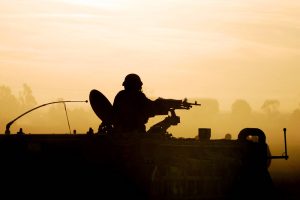
The National Guard, with its Army and Air divisions, is comprised of around 450,000 personnel, with roughly 336,000 and 114,000 staff in those respective organizations. It’s a highly decorated, dependable and capable reservist force, able to secure the homeland in a range of technical and force-projection disciplines. They may also deploy overseas, and work with both state and federal mission objectives depending on needs.
As you may imagine, a force of such size offers a range of coveted roles to prospective applicants. In this post, we’ll discuss ten of the most popular jobs in the National Guard, what they do, and what it takes to be part of that discipline.
Note that these roles are often part of the main military branches, too. This is because the National Guard is a reservist force that contributes to the main disciplines and is wholly part of them, not a separate branch like the Marines.
Army National Guard
- Infantry Officer
Infantry Officers are tasked with and responsible for leading soldiers in various combat operations, supporting the logistics of their units, and planning combat operations, liaising with other disciplines to do so. The training course takes 17 weeks to achieve, developing recruits into capable leaders able to command and control armed companies and company-sized units of up to 300 soldiers in size.
- Human Resources Specialist
The United States military is comprised of millions of full-time and reservist personnel, posing a mighty logistical task for managing people, their careers, and the wider well-being of the armed forces. As such, human resources specialists occupy vital roles dedicated to the management, optimization, and necessary stewardship of personnel. They provide support to soldiers as well as their families. They also provide support with military regulations and standards, manage entitlements and leave, as well as recruiting and retain essential soldiers, reducing staff turnover. Human Resource Specialists are there to lubricate the machine of the armed forces, and as such, they are highly important and sought after.
- Military Intelligence
No branch of the military can operate without good intelligence. Good reconnaissance, surveillance, human intelligence (HUMINT), signals intelligence (SIGINT) and imagery analysis are all required for each branch to operate effectively.
As a reservist in Military Intelligence, you will collect information that supports military planning, and present key data to those in command. This can ensure the best decision-making efforts are made, and that has an effect on the entire chain. This role will require additional security vetting to gauge the trustworthiness of each applicant. It’s a highly sought-after role, but a prestigious effort to be part of.
- Military Police Officer
Military Police Officers make certain that law and order is followed, within regulations, in each military installation. They perform specialized police work in a militarized environment. This can include conducting investigations, referring soldiers for disciplinary measures, and sometimes responding to emergencies. They’re also known as ambassadors for each military station, ensuring that ties and relations with the local community are positive. As such, they can be relied upon for safety and security.
- Combat Engineers
Combat Engineers are vital infrastructure and technical support specialists, establishing forward operating bases, military fortifications, bridges, roads and more. They may be on the front lines of combat, while also plying their trade to construct some of the most essential logistical support expertise possible, constructing and maintaining critical assets as all branches occupy and move through combat zones. As such, they’re a fundamental component of any capable fighting force.
Air National Guard
- Pilot
It would be remiss of us not to mention the main job role anyone thinks of when considering the Air Force and its reservist counterpart – that of a Pilot. Flying a range of aircraft, pilots supporting humanitarian missions, developing flight plans, combat, reconnaissance and of course, logistics. They’re the backbone of the Air Force and National Guard, as without them, this branch would be entirely useless. As such, they receive extensive training and the field is highly competitive.
- Aircraft Maintenance Technicians
Without these essential personnel, the Air National Guard would grind to a halt. They’re the specialists responsible for all aspects of Aircraft upkeep, be that inspecting, repairing, troubleshooting or properly cataloging issues. They ensure that aircraft remain in proper working order and as such, sustain the viability and safety of such vehicles. They are required in every single area of operation the National Guard and USAF finds itself in.
- Cyber Systems Operator
Cyber System operators secure and maintain computer systems and networks on a daily basis. They sustain digital uptime, prevent cyber attacks, and train personnel on proper digital hygiene and network security measures. Cyber is one of the fastest-growing specialisms in every single division, and as such they’re a vital component of the Air National Guard.
- Air Traffic Controllers
The continual flow of aircraft in and out of operational bases, air fields and military bases is essential to consider, as is the safety of air traffic in the skies. Air Traffic controllers monitor radar displays, communicate through encrypted channels, and are often in tight communication with pilots. Through that, they are able to better direct pilots to their destinations and maintain the rigorous standards of aircraft logistics.
- Intelligence Analysts
Like the Army National Guard and branch-specific Intelligence specialisms, Intelligence Analysis for the Air National Guard encompasses a wide array of disciplines dedicated to curating and communicating intelligence internally. However, the Air Force reservists have the chance to make use of highly specific tools, from overhead drones to surveillance planes and more. As such, they use highly specialized methods for imagery analysis, signals intelligence and cyber. Liaising with their Intelligence Officers at all levels, they’re responsible for the data-gathering necessities before each operation, and some are attached to flight crews who travel all over the world.
We hope this guide provides you with insight. For more information, please visit the official websites of the Army and Air National Guard, and look through their role-finder tools. Recruitment Officers will be able to provide current and up-to-date information about each specific specialism and the wider role it serves in the National Guard.
